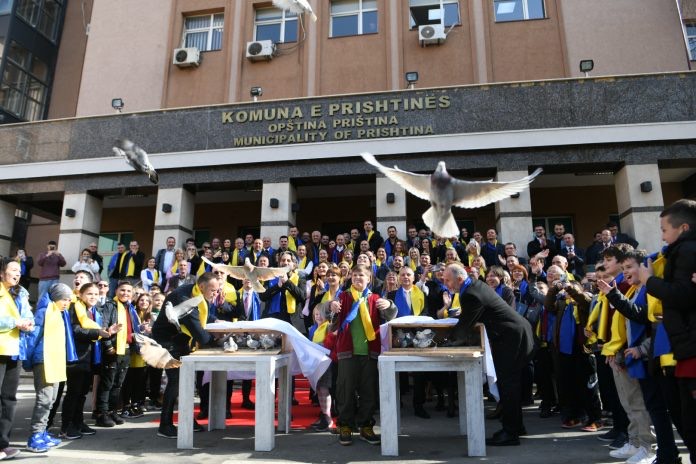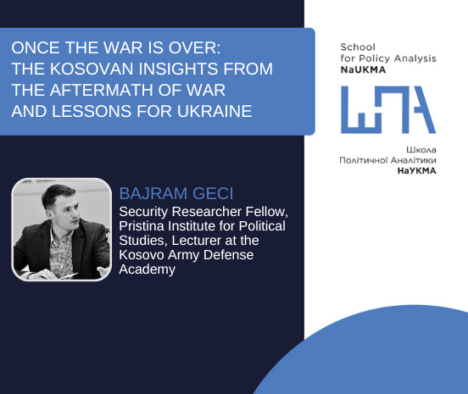Kosovo has experienced the war with Serbia and the aftermath of the war deserves particular attention because Ukraine can draw a number of lessons from it. We talked with Bajram Geci – Security Researcher Fellow, Pristina Institute for Political Studies, Lecturer at the Kosovo Army Defense Academy, about Kosovan insights from the aftermath of war and asked about what our country may learn from it during the online lecture.
Kosovo is in line with supporting Ukraine in the war of Russia against Ukraine. The President of Kosovo Vjosa Osmani, together with many other residents of Prishtina, marched in support of Ukraine right after the russian invasion. Mr. Geci showed the photos of Ukraine-supporting protests from Kosovo.

He also briefly presented the history of Kosovo, including the Vilayet of Kosovo, the League of Prizren, during the First Balkan Wars, the period of Yugoslavia, and, of course, the period after it.
When talking about the Kosovan experience of horrible atrocities, Mr. Geci spoke about the mass terror of Serbs in Kosovo, including the rapings of civilians (overall 20,000 raped victims), the problems of refugees (850,000 refugees who fled into Albania and Macedonia and the fact that Kosovo has to deal with the problem of those who had to flee Kosovo during the war) 700 schools burnt down by serbs during the war.
Bahram Geci emphasized on key points in which Kosovo have experience and can help to Ukraine during and after the war:
- Helping victims who were raped, tortured or abused during the war.
- Cleaning mined areas.
- Resistance to propaganda on the international arena, which can be used by the invaders as an instrument to discredit the politicians from Ukraine as Serbia has done towards the Kossovan leaders.
- Resistance to fake witnesses who are paid for testifying fabricated “memories” in court.
The experience of Kosovo shows that many of the war time leaders later on went into politics which for Ukraine may mean that those leaders can take leadership roles in the post-war politics. The peace building of the country that wins a war is much easier than that of the country that loses the war, which means that the aftermath of war will be largely defined by how the war ends. Bajram Geci believes that Ukraine will be supported by the international community during the process of post-war reconstruction, mainly in the economic sphere.
This summary was conducted by School for Policy Analysis NaUKMA as part of its project implemented under the USAID/ENGAGE activity, which is funded by the United States Agency for International Development (USAID) and implemented by Pact. The contents of this summary are the sole responsibility of Pact and its implementing partners and do not necessarily reflect the views of USAID or the United States Government.

